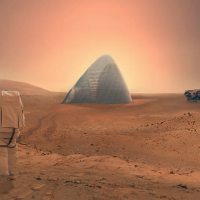Be a Habitat Maker for NASA and Win $1.1 Million

NASA is preparing for a very long journey to send humans to Mars by the 2030s, and like any long long trip, there’s lots of prep involved. Such as, where will the world travelers stay? A trip to the Red Planet will eventually require shelter, and NASA is offering $1.1 million in prize money as part of the 3D-Printed Habitat Challenge for new ways to create sustainable housing solutions where future space explorers can live and work.
Here’s what you need to know:
- Registration for Phase 2 is now open; teams have until January 31, 2017 to sign up. Competitors must demonstrate a recycling system that can create structural components using terrestrial and space-based materials and recyclables. The challenge will culminate in a ground competition in August 2017 at the Caterpillar proving ground facilities in Peoria. Caterpillar is a sponsor of the event.
- Entrepreneurs, investors, and professionals from fields such as architecture, engineering, manufacturing, construction, real estate, and others with strong problem-solving skills are encouraged.
- Citizen inventors must use readily available and recyclable materials, such as feedstock, to print habitats.
Phase 1 of the 3D-Printed Habitat Challenge was a competition to design a structure that could be 3D-printed using resources already available on Mars. Completed in 2015, the three design finalists can be viewed here. They’re pretty spectacular! Phase 3 (to be announced at a later date) will focus on 3D-printing fabrication of complete habitats.
“Shelter is an obvious necessity as we prepare to explore worlds beyond our home planet, but space and weight aboard our vehicles are precious, and taken by the many other resources we will need for survival,” said Steve Jurczyk, associate administrator for NASA’s Space Technology Mission Directorate. “That’s why we are seeking the technology to reuse the materials we will already be carrying, and combine them with what is already available at our destination, which is, in this case, soil. We recycle here on Earth – why not on Mars?”
The contest has potential immediate practical benefits as well on Earth to produce affordable housing or shelter where access to conventional building materials and skills is limited.
To register and to see the official rules and documents, visit http://bradley.edu/challenge.

